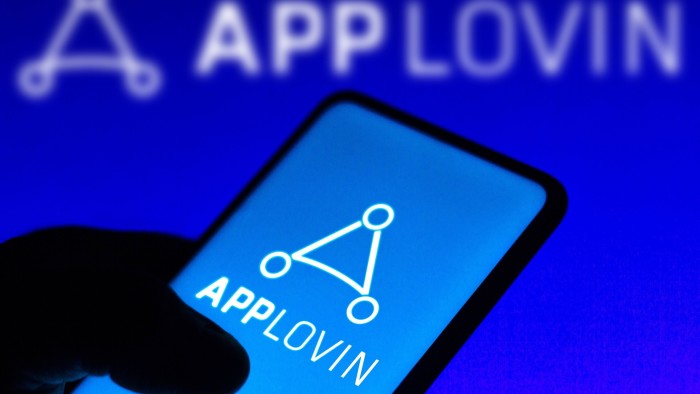Unlock the Editor’s Digest for free
Roula Khalaf, Editor of the FT, selects her favourite stories in this weekly newsletter.
Private equity groups do not like leaving money on the table, even if they still come away with pockets stuffed. Digital ad phenomenon Applovin is, for one particular buyout firm, the bonanza that got away.
Until a year ago Applovin was a largely obscure Silicon Valley start-up trying to morph from a mobile games developer into an adtech mainstay. Mission accomplished. Its quarterly results released on Wednesday showed revenue in its advertising segment, which helps clients buy and sell ads in smartphone apps, jumped 75 per cent for the year. Its shares surged almost 30 per cent.
Since the start of 2023, Applovin’s share price has rocketed from $10, well below its initial public offering price of $80, to more than $450. Its market capitalisation of $150bn is remarkable given analysts project annual revenue of just $7bn in 2027. Some boosters believe the company should be added as a member to an augmented Magnificent Eight.
KKR, the private equity titan, helped birth this monster. It invested $400mn of so-called minority growth equity in 2018 at a $2bn valuation. At the time the company went public in 2021, KKR’s roughly one-third stake in the company was worth $9bn. Yet because of the fact the buyout group offloaded its shares below the IPO valuation and before the recent super-rally, its cash haul was about $8bn.
Think what might have been. A crude calculation shows that if KKR had held on since the IPO, all things being equal, its piece of Applovin would now be worth more than $50bn, making it a private equity windfall for the ages.
Those close to the investment group point out all things are not equal. Applovin repurchased and retired some of the shares KKR sold since the IPO, so if the buyout group had held all its shares, then today’s stock price would be proportionately lower. The adtech start-up has operating margins above 60 per cent and, for its part, it was smart to use cash flow to buy back those shares cheaply in the years before the run-up.
Still, it is fair to say KKR has missed at least tens of billions in profit. True, it is not like it could have known Applovin would attain a share price that defies old-school valuation methods. Private equity firms face the imperative of locking in gains and sending cash winnings back to investors within a few years of deployment.
So-called growth investing became a habit for KKR and peers such as Blackstone in the 2010s, partly because there were few undervalued companies they could target for traditional leveraged buyouts. The group undoubtedly believes its expertise was additive. KKR’s total profit of more than $7bn suggests that with Applovin it got lucky too. It’s just a shame that, had it held on, it could have been even more so.
Source link









